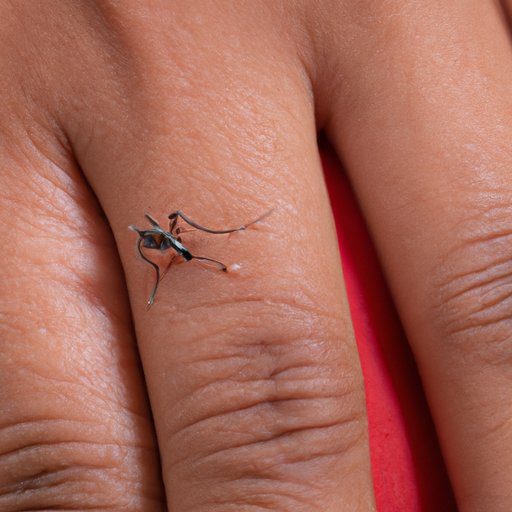
Can You Get AIDS from a Mosquito Bite? Debunking Myths and Misconceptions
AIDS, or acquired immunodeficiency syndrome, is a serious condition that affects millions of people around the world. Since its discovery in the early 1980s, there have been many misconceptions surrounding how the virus that causes AIDS, HIV, can be transmitted from one person to another. One of the most common misconceptions is that you can contract HIV from a mosquito bite. In this article, we will explore whether or not there is any truth to this claim, and provide readers with helpful information to understand HIV transmission and protection from the virus.
Fact or Fiction: Can You Really Get AIDS from a Mosquito Bite?
The short answer is no, you cannot get AIDS from a mosquito bite. While mosquitoes are known to transmit various diseases, including malaria, Zika, and West Nile virus, they cannot transmit HIV. The reason for this is that HIV cannot survive in a mosquito’s body, nor can it replicate. HIV requires specific human cells to replicate, namely CD4 cells, which are not found in mosquitoes.
There has never been a confirmed case of HIV transmission from a mosquito bite anywhere in the world. The World Health Organization and numerous scientific studies have also confirmed that mosquitoes cannot transmit HIV. Additionally, HIV is a relatively weak virus outside of the human body. If it were to be ingested by a mosquito, it would be rapidly destroyed by the mosquito’s digestive system, preventing transmission to another host.
Misconceptions about HIV Transmission: Understanding How the Virus Spreads
It is important to understand how HIV can and cannot be transmitted in order to protect oneself from contracting the virus. HIV is primarily transmitted through specific bodily fluids, including blood, semen, vaginal secretions, and breast milk. The virus can be transmitted through sexual contact, sharing needles, from mother to child during pregnancy, birth, or breastfeeding, and through blood transfusions with infected blood.
HIV cannot be transmitted through casual contact such as hugging, kissing, or sharing utensils, nor can it be spread through the air, water, or food. It is also not possible to contract HIV through mosquito bites, as previously mentioned.
Mosquitoes Transmit Many Diseases – But AIDS Isn’t One of Them
While mosquitoes can transmit various diseases, including malaria, Zika, and West Nile virus, they cannot transmit AIDS. HIV is a fragile virus that does not survive well outside of its host, and it requires specific human cells to reproduce. Mosquitoes do not have these specific human cells, making HIV transmission from mosquitoes impossible.
What’s the Real Risk of Contracting AIDS from a Mosquito?
According to scientific studies, the risk of contracting HIV from a mosquito bite is negligible, if not non-existent. This is because the virus is not able to survive or replicate in a mosquito’s body. Furthermore, while mosquitoes can bite multiple people in succession, they do not inject the same blood that they have previously ingested. Thus, even if a mosquito has bitten an HIV-positive individual, the chance that it would transfer that specific person’s infected blood via its saliva to another person would be extremely low.
The best way to prevent HIV transmission is to avoid exposure to the virus. This includes practicing safe sex, using condoms, avoiding sharing needles or other drug injection equipment, and getting tested for HIV regularly.
Understanding the Role of Mosquitoes in HIV-Related Stigma
The false belief that HIV can be transmitted via mosquito bites has contributed to HIV-related stigma. This stigmatization can lead to discrimination and prejudice against affected communities. It is important to dispel widespread myths and misunderstandings about HIV transmission so that people can develop accurate and informed opinions.
It is essential to seek advice on HIV prevention and transmission from reliable sources. Inaccurate and misleading information can lead to widespread stigma, exclusion, and unjust attitudes towards people living with HIV. To ensure that HIV-related stigma and discrimination remain low, we must educate ourselves and others about the nature of HIV and its modes of transmission.
How You Really Get HIV: A Comprehensive Guide to Transmission
As previously mentioned, HIV can only be transmitted through specific bodily fluids, namely blood, semen, vaginal secretions, and breast milk. The most common routes of transmission are sexual contact, sharing needles or other infected equipment, and mother-to-child transmission. HIV is not spread through casual contact, such as hugging or shaking hands, nor is it spread through mosquito bites, saliva, urine or feces, or breathing the same air as an HIV-infected person.
The Truth About Mosquitoes and AIDS – Debunking Myths and Misconceptions
In summary, HIV cannot be transmitted through mosquito bites. Mosquitoes do not have the specific human cells necessary for the replication and growth of HIV, so the virus cannot be transmitted through their bites. HIV is primarily transmitted through sexual contact, sharing drug injection equipment, and mother-to-child transmission. HIV is a serious illness that requires ongoing treatment, but it is important to understand that it is not easily transmitted and can be managed with proper care and medication.
Conclusion
In conclusion, it is not possible to contract HIV from a mosquito bite. While mosquitoes can transmit various diseases, HIV is not one of them. The best way to protect oneself from HIV is to practice safe sex, avoid sharing needles or other drug injection equipment, and get tested for HIV regularly. By separating fact from fiction when it comes to HIV transmission, we can better understand this complex illness and de-stigmatize those living with it.





